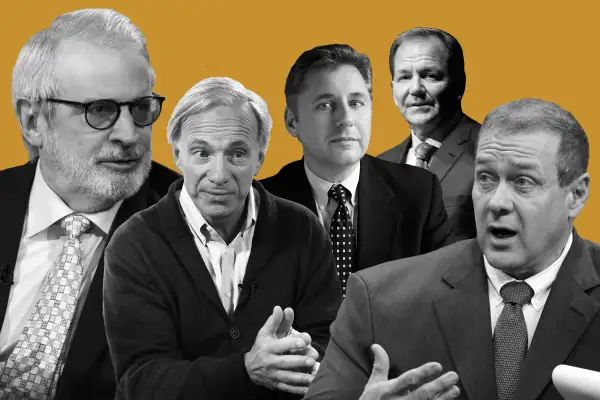'Just Around the Bend': This Is When the Stock Market Will Crash, According to 5 Famous Investors
Money is not a client of any investment adviser featured on this page. The information provided on this page is for educational purposes only and is not intended as investment advice. Money does not offer advisory services.

Just when you thought it was safe to be in the market again, the Dow Jones industrial average sank more than 420 points, or just under 2%, on Tuesday.
By one measure, Wall Street hasn't been this scary since the depths of the global financial panic in 2009. So is this the end of the bull market?
Most market watchers say no. In fact, only 18% of money managers surveyed by Bank of America Merrill Lynch believe that stocks have peaked.
Yet the market is historically frothy after a near-record nine-year bull run. And if history teaches us anything, it's that the key to success in investing is a willingness to go against the grain.
That's what these five well-known strategists are known for. And their warnings about impending market doom shouldn't go unheeded.
The Bear: David Stockman
Who he is: Former budget director for the Reagan White House; former investment banker with Salomon Brothers; former private equity investor.
When to expect the worst: Imminent. "There is surely a doozy just around the bend."
His reasoning: Stockman expects "an epic monetary and fiscal (policy) collision," he told CNBC. On the one hand, the recent tax cuts enacted by Congress are likely to help push the federal budget deficit to nearly $1 trillion next year. At the exact same time, the Federal Reserve is starting to unwind its sizable bond portfolio — which it amassed in the aftermath of the financial crisis to keep bond yields low to juice economy activity.
The result of the Treasury Department and Fed both selling mountains of U.S. bonds in the open market? A monumental jump in market interest rates that will likely spook the historically frothy stock market.
Yet investors seem to be in denial, he said, adding that "the market is whistling past the graveyard."
The Bear: Scott Minerd
Who he is: Global chief investment officer and chairman of investments for Guggenheim Partners
When to expect the worst: 2019. "The markets are potentially on a collision course for disaster."
His reasoning: Strong fiscal stimulus at the end of this business cycle, at a time when the economy is already at so-called full employment, is likely to force the Federal Reserve to step in and be more aggressive with interest rate hikes to try to keep inflation in check, Minerd fears.
As market rates spike, it will be that much harder for financially weak companies to meet their obligations, especially after the initial impact from the Trump tax cuts subside.
Short-term rates only need to reach 3% to increase corporate defaults, according to Minerd, who expects the Fed to raise rates four times in 2018 and "probably four times next year." That implies short-term rates will hit 2.5% to 2.75% a year from now and will be 3.25% to 3.5% a year after that.
Over the next year, "equities will probably continue to go up as we have all these stock buybacks and free cash flow," Minerd told CNBC. But "ultimately, when the chickens come home to roost and we have a recession, we're going to see a lot of pressure on equities especially as defaults rise, and I think once we reach a peak that we'll probably see a 40% retracement in equities."
Minerd likens today's market to 1987, when stocks suffered a major collapse in October. That year, the market got off to a fast start before investors began to fear the Fed was too slow to address inflationary pressures. "Today, investors have the same sorts of concerns they had in 1987," he told clients earlier this year.
The Bear: Paul Tudor Jones
Who he is: Famed hedge fund manager and founder of The Tudor Group. He is credited for having called the October 1987 market crash.
When to expect the worst: As soon as next year. “We are replaying an age-old storyline of financial bubbles that has been played many times before."
His reasoning: "We have the strongest economy in 40 years, at full employment. The mood is euphoric. But it is unsustainable and comes with costs such as bubbles in stocks and credit," Jones said in an interview with Goldman Sachs.
The notoriously media shy hedge fund billionaire believes a recession is coming in the next year or so, because the Fed took too long to raise rates to keep the economy from overheating.
Inflation will follow faster than expected, Jones told his shareholders in a February letter, forcing the Fed to increase rates quicker than stated. “This market’s current temperament feels so much like either Japan in 1989 or the U.S. in 1999," he told clients, according to Bloomberg.
For the record, Japanese stocks slipped into an epic bear market at the beginning of 1990 and the tech bubble burst in the U.S. in March 2000.
"The events that have transpired so far this January make me feel more convinced than ever of this repeating history,” Tudor said.
The Bear: Ray Dalio
Who he is: Famed investor and founder of Bridgewater Associates, the world's largest hedge fund.
When to expect the worst: By 2020. “I think we are in a pre-bubble stage that could go into a bubble stage."
His reasoning: The chance of the U.S. economy suffering a recession before the next presidential election is around 70%, Dalio said at a recent appearance at the Harvard Kennedy School’s Institute of Politics.
The influx of cash into the market, both due to Trump’s tax cuts, and future initiatives – like an infrastructure bill – combined with a strong economy will force the Federal Reserve to raise rates to combat inflation. That’s never an easy task for the Fed. “The risks of a recession in the next 18-24 months are rising,” wrote Dalio.
Keep in mind, though, that the stock market has historically anticipated recessions by six to 12 months, so the real selling could begin well before that.
The Bear: John Hussman
Who he is: President, Hussman Investment Trust and well-known contrarian investor
When to expect the worst: It's anyone's guess. But when the bear does emerge from hibernation, expect "a market loss on the order of 60%."
His reasoning: Hussman has warned about a market crash for a couple years now, as stock valuations reach highs not seen since 2000, right before the dotcom bubble popped. He argues that speculation has driven investors to propel this over-priced market higher.
Blind optimism over the tax cuts have led Wall Street analysts to produce a 2019 forward earnings estimate that’s 46% greater than the most recent 12-month operating earnings for the S&P 500, he said. “The combination of extreme valuations and extreme earnings expectations creates a situation that’s ripe for disappointment,” wrote Hussman in a recent blog post on his company site.
Hussman adds that the volatility seen in the market is due to more investors becoming risk averse, fearing a significant drop.
